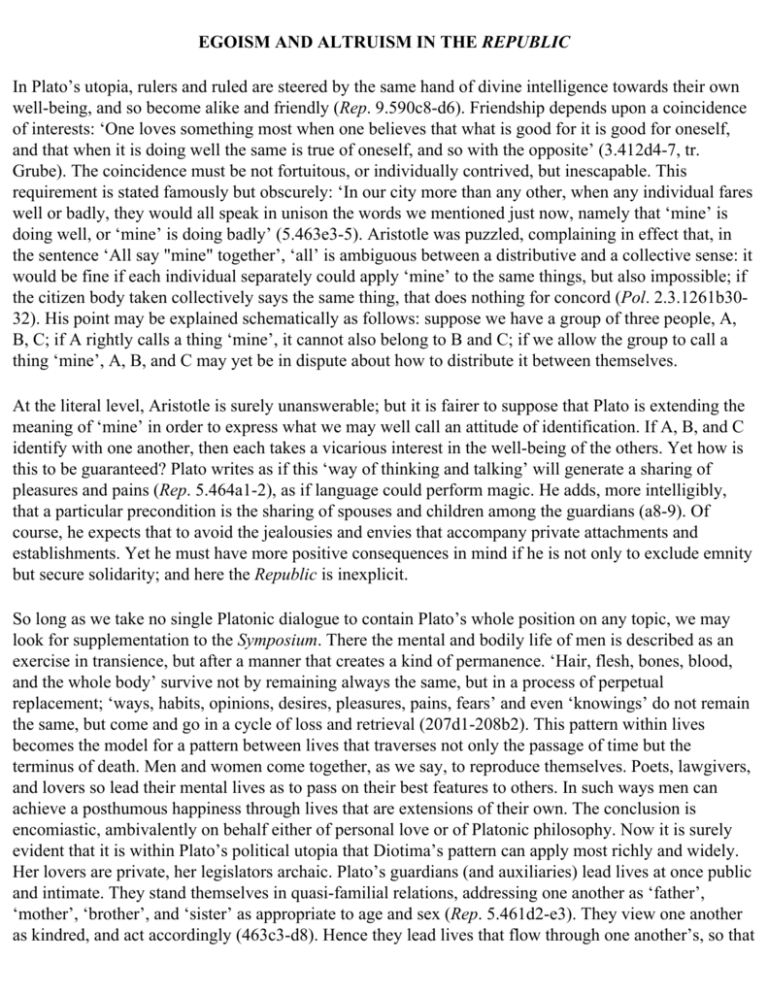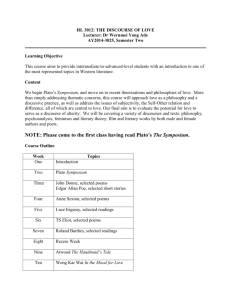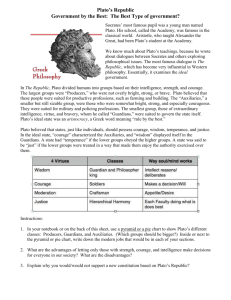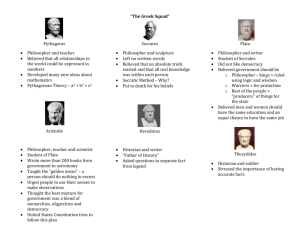ethics of plato's republic
advertisement

EGOISM AND ALTRUISM IN THE REPUBLIC In Plato’s utopia, rulers and ruled are steered by the same hand of divine intelligence towards their own well-being, and so become alike and friendly (Rep. 9.590c8-d6). Friendship depends upon a coincidence of interests: ‘One loves something most when one believes that what is good for it is good for oneself, and that when it is doing well the same is true of oneself, and so with the opposite’ (3.412d4-7, tr. Grube). The coincidence must be not fortuitous, or individually contrived, but inescapable. This requirement is stated famously but obscurely: ‘In our city more than any other, when any individual fares well or badly, they would all speak in unison the words we mentioned just now, namely that ‘mine’ is doing well, or ‘mine’ is doing badly’ (5.463e3-5). Aristotle was puzzled, complaining in effect that, in the sentence ‘All say "mine" together’, ‘all’ is ambiguous between a distributive and a collective sense: it would be fine if each individual separately could apply ‘mine’ to the same things, but also impossible; if the citizen body taken collectively says the same thing, that does nothing for concord (Pol. 2.3.1261b3032). His point may be explained schematically as follows: suppose we have a group of three people, A, B, C; if A rightly calls a thing ‘mine’, it cannot also belong to B and C; if we allow the group to call a thing ‘mine’, A, B, and C may yet be in dispute about how to distribute it between themselves. At the literal level, Aristotle is surely unanswerable; but it is fairer to suppose that Plato is extending the meaning of ‘mine’ in order to express what we may well call an attitude of identification. If A, B, and C identify with one another, then each takes a vicarious interest in the well-being of the others. Yet how is this to be guaranteed? Plato writes as if this ‘way of thinking and talking’ will generate a sharing of pleasures and pains (Rep. 5.464a1-2), as if language could perform magic. He adds, more intelligibly, that a particular precondition is the sharing of spouses and children among the guardians (a8-9). Of course, he expects that to avoid the jealousies and envies that accompany private attachments and establishments. Yet he must have more positive consequences in mind if he is not only to exclude emnity but secure solidarity; and here the Republic is inexplicit. So long as we take no single Platonic dialogue to contain Plato’s whole position on any topic, we may look for supplementation to the Symposium. There the mental and bodily life of men is described as an exercise in transience, but after a manner that creates a kind of permanence. ‘Hair, flesh, bones, blood, and the whole body’ survive not by remaining always the same, but in a process of perpetual replacement; ‘ways, habits, opinions, desires, pleasures, pains, fears’ and even ‘knowings’ do not remain the same, but come and go in a cycle of loss and retrieval (207d1-208b2). This pattern within lives becomes the model for a pattern between lives that traverses not only the passage of time but the terminus of death. Men and women come together, as we say, to reproduce themselves. Poets, lawgivers, and lovers so lead their mental lives as to pass on their best features to others. In such ways men can achieve a posthumous happiness through lives that are extensions of their own. The conclusion is encomiastic, ambivalently on behalf either of personal love or of Platonic philosophy. Now it is surely evident that it is within Plato’s political utopia that Diotima’s pattern can apply most richly and widely. Her lovers are private, her legislators archaic. Plato’s guardians (and auxiliaries) lead lives at once public and intimate. They stand themselves in quasi-familial relations, addressing one another as ‘father’, ‘mother’, ‘brother’, and ‘sister’ as appropriate to age and sex (Rep. 5.461d2-e3). They view one another as kindred, and act accordingly (463c3-d8). Hence they lead lives that flow through one another’s, so that any number of them share responsibility for any stretch of activity. It is true that erotic love is marginal to Plato’s utopia. Yet he may have been aware of a certain sleight of hand that he was permitting Socrates in the Symposium. If passing on one’s life, mental or physical, is really a way of escaping death and achieving a kind of immortality, it is not evident that it should need an erotic stimulus. Indeed, Homer and Hesiod, Lycurgus and Solon, are cited as exemplary mental progenitors with no imputation that they owed their inspiration to love (209c7-e4). Hence the Republic’s somewhat skeletal picture of civic solidarity can invite fleshing-out by the interpersonal structures of the Symposium without having to annex its central subject-matter. Celebrated poets and effective legislators point to a further widening relevant to the Republic. The edifying lover looks not only for a beautiful body, but also for a soul that is ‘beautiful, noble, and wellendowed’ (Symp. 209b6). By contrast, poets who become part of a national curriculum, and legislators who create a constitution, may hope to make future citizens better than they would otherwise have been, but cannot choose to have an impact only upon the able and congenial. They may still count as disseminating their mentalities widely, even to alien and mediocre minds, but through a glass darkly. The philosopher-kings (and queens) of the Republic put into practice their vision of the Forms by applying it to the characters of others both in private, where they may cultivate congeniality, and in public, where they will mostly be creating not philosophic but popular virtue (6.500d4-8). This will be a virtue neither identical nor contrasted with their own, of which it is a popularized adaptation. It will bear their mark, but translated from its proper medium to one only receptive of it in part. Thus certain extensions of Diotima’s theory of love are already intimated within the Symposium itself. There is another, however, that would be out of place there, but is requisite within the Republic. It is evident to reflection that a more determinant active life flows from ruler to ruled than reversely. The artisans who receive moral guidance from the guardians are thereby guided in a manner in which guardians who receive physical sustenance from the artisans are not. The worker merely keeps the philosopher going; the philosopher-king keeps the worker going one way rather than another. This asymmetry repeats a lack of reciprocity within the Symposium: it was, for instance, the lover who transmits his virtues to the boy; these they then share, but to the effect that the boy’s life realizes the man’s mentality (209a8-c7). As was not spelled out, but must be implicit, the man can die and leave his original mentality (that of which he was pregnant, c3) behind him, as the boy cannot. Of course, it is easy enough to supply a correlative motive to yield a mutual sense of solidarity: recipient will be linked to donor by gratitude. But that is not a motive explained by the ultimate goal that Diotima gave to all desire: achieving the good for oneself for ever (206b11-12). If the interpersonal identifications of the Republic are to be reciprocal, they cannot fully be yielded – though none is excluded – by that teleology. Essential for the artisans is a respect precisely for justice. It is then unsurprising that the explicit ground that Socrates gives his philosophers for ruling is nothing more theoretical than an obligation to repay a public education (Rep. 7.520b6-c3). Yet this does not suffice to explain the sense of civic solidarity: justice indeed brings concord and friendship (Rep. 1.351d5-6), but only to those engaged in a common cause (cf. c9). So supplementation is demanded. Yet there is an objection to citing the Symposium: if the philosopher-kings of the Republic are motivated rather like the lovers of the Symposium, is it not strange that the latter are enthusiastic, but the former, as Socrates insists, reluctant (7.520d1-521b11)? A charm of Diotima’s story is that it recruits egoism against selfishness: holding back from benefiting others becomes a way of frustrating one’s desire for immortality; a wiser egoism is extended and, in effect, altruistic. On that view, one might expect to find philosophers competing to pass on their own virtues through ruling. However, the point presumes that it is egoism that makes philosophers prefer to devote themselves to philosophy, while there is a quite different diagnosis: for a philosopher, it must be a drawback with ruling that the life that it passes on is one of practical virtue (and that, in most cases, popularized), and not of philosophy. Socrates expects no reluctance of auxiliaries or artisans – not that he takes an equal interest in their psychology. What is problematic for him to explain is why philosophers deign to rule, and not why they are willing to take part in higher education. The obstacle is not a lack of extended egoism, but an excess of highmindedness. It is descending into the Cave that risks being a self-sacrifice (520c1-3), and not entering the seminar-room. The enthusiastic lover of the Symposium and the reluctant ruler of the Republic may still evidence the same teleology. Let me now restate the positive explication of Plato’s civic solidarity that I hope survives objections and qualifications. His extended ‘mine’ expresses an attitude of identification that comes of lives lived together in mutual interdependence. The relations may be of co-operation within a class, as when philosopher philosophizes with philosopher, or ditch-digger digs with ditch-digger, or of beneficence between classes, as when philosopher directs ditch-digger, and ditch-digger nourishes philosopher. The moral benefactor feels himself alive in the virtues that he passes on, in however vulgarized a form, so that he wishes their possessors well; the moral beneficiary is grateful for the virtues that he inherits, so that he wishes their originators well. This is a political application of interpersonal structures most evident in the relations of friends and lovers. The proverb ‘Friends share all’ becomes true not just of the possession of women and children among the male guardians (4.424a1-2, 5.449c5), but of good and ill fortune throughout the civic community. Guardians love all guardians equally, with a non-discriminative use of the terms of familial affection (‘father’, ‘mother’, ‘brother’, ‘sister’); in the contemporary communitarian jargon of ‘inclusion’ and ‘exclusion’, they stand to one another in a relation of total and unqualified inclusion. Next only to that, they love the artisans who at once make possible and actual their capacity to enact philosophy (their own if they be philosophers, their friends’ if they be auxiliaries) even within the world of non-philosophers. Private attachments are displaced by public commitments that display the intensest possible devotion over the widest practicable domain. Thus, and only thus, can a city be ‘one to the greatest possible degree’ (Laws 5.739d3-4).







